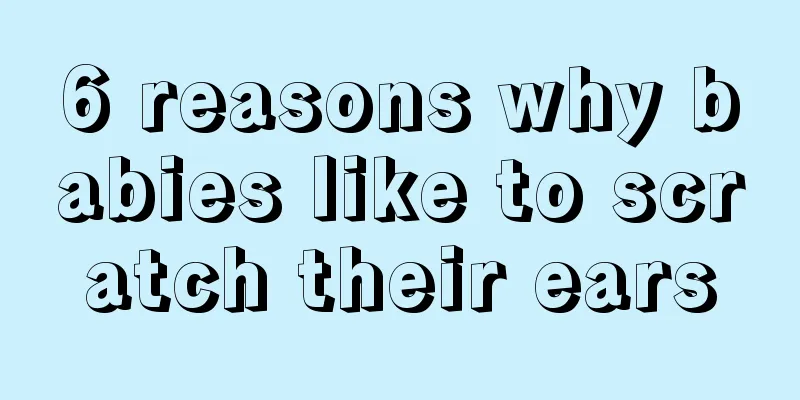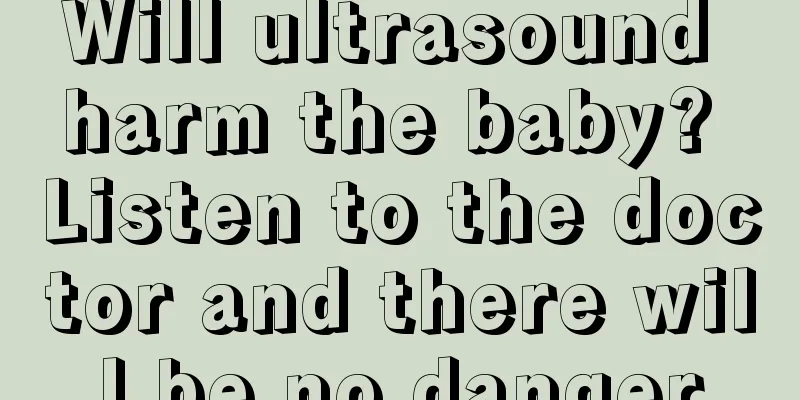Should I reduce the amount of milk for babies with intestinal bloating? Will babies with intestinal bloating lose their appetite?

|
Infant flatulence is a common symptom, and there are many reasons for it. Many mothers find that their babies eat less after they have flatulence. So here we will find out whether it is necessary to reduce the amount of milk for infants with intestinal flatulence? Will infants with intestinal flatulence lose their appetite? Should I reduce the amount of milk if my baby has intestinal gas?If the baby has bloating, he will eat less. Bloating usually occurs when the baby inhales too much air due to the large bottle hole or incorrect posture during feeding, which causes the baby to feel uncomfortable due to bloating. The baby's aversion to milk can be improved by massaging or blocking the causes of bloating. Babies are more prone to bloating than adults. If the baby eats and sucks too quickly, air will be inhaled into the abdomen; if the nipple hole of the bottle is not of the right size, air will enter the baby's body through the gap of the nipple; in addition, the baby cries too much and inhales air; eating milk or other food, fermented in the digestive tract by intestinal bacteria and other digestive enzymes, and producing a large amount of gas will cause bloating. If the baby can eat, poop, has no vomiting, feels soft in the stomach, has good mobility, has normal gas discharge, and has normal weight gain, this type of bloating is mostly functional bloating, and no special treatment is required, as long as preventive measures are taken. Will babies lose their appetite due to intestinal gas?Infant flatulence may lead to anorexia. If the abdominal distension is obvious, accompanied by frequent vomiting, the baby is in poor spirits, does not eat milk, and the abdominal wall is hard, shiny and red. Some people may see exposed small blood vessels (medically known as varicose veins) and palpable lumps. In addition, the baby's stomach is ringing, which is mainly because a lot of air is swallowed when feeding. This is the sound of gas and liquid moving with the intestines. It is recommended that mothers should keep the baby's head slightly higher every time they breastfeed or feed their babies, and the nipple hole should be filled with milk to prevent the baby from drinking air. After the baby finishes drinking milk, he should stand up and pat his back until he burps. When the baby sucks milk by burping, allowing the baby to inhale the air in the stomach together will relieve this symptom. Newborns suffer from intestinal flatulence, and the main symptoms are abdominal distension, bloating, loss of appetite, and crying and restlessness. In this case, indigestion or cold stimulation is usually considered. You can give the baby a hot compress or massage the abdomen to promote intestinal peristalsis and promote exhaust. You should pay attention to your diet and avoid eating sweets, greasy foods, and raw and cold foods. The baby may suffer from flatulence, such as vomiting, poor diet, loss of appetite, etc. Therefore, in this case, the baby needs to be given some intestinal probiotics to improve it, and pay attention to eating less food and feeding some water between meals. Will babies with intestinal gas keep wanting to feed?Generally, the main reason for newborns to have intestinal gas is that the baby's abdomen is cold or the baby eats a lot of milk at a time, which causes improper feeding, and the baby may have gas. Generally, when the baby has gas, he will be unwilling to eat milk. If the baby keeps eating milk, it means that the baby is not full, or the baby's stomach is uncomfortable, and the baby is seeking stability, so the baby's abdominal gas should be relieved in time. If the baby's intestinal gas is caused by cold abdomen, you can use a warm water bag to heat the baby's abdomen to effectively relieve the baby's gas. If the baby is not full or inhales a lot of air due to improper feeding, crying during feeding can swallow a lot of gas, causing intestinal gas. To relieve the baby's intestinal gas, you can massage the baby's abdomen clockwise with your hands, which can effectively relieve the baby's gas. In addition, if the baby keeps eating milk, it means that the baby's stomach is uncomfortable or not full. You can pick up the baby and pat the baby's back to promote the relief of the baby's intestinal gas. Can baby flatulence cause constipation?The baby's bloating may lead to constipation, so when the baby has bloating, it is necessary to relieve it in time. You can help the baby massage the abdomen in a clockwise manner, and you can also help the baby do more passive movements. If the adverse symptoms are more serious, you need to use medication under the guidance of a doctor to prevent the occurrence of adverse symptoms. When the baby has bloating, it is mostly caused by bad eating habits. If the complementary food added to the baby is not easy to digest, it may cause food to accumulate in the body for a long time, thus causing bloating. Therefore, it is necessary to do preventive work in advance. When adding complementary food to the baby, it is necessary to focus on easily digestible food. |
<<: What is water birth? What are the precautions for water birth?
Recommend
How can pregnant women supplement calcium in the healthiest way? What are the precautions for pregnant women to supplement calcium?
Your own physical health is very important during...
What diseases can affect pregnancy and avoid the risk of infertility
Some women have been unable to conceive for a lon...
Do I need to be on an empty stomach to test the pregnancy stick? Can I test the pregnancy stick after a meal?
In the early stages of pregnancy, it is best to u...
How many months can babies eat pureed meat? At what age can babies start eating meat?
When to start adding complementary food to babies...
How are twins born in pairs? Can test-tube babies create twins in pairs?
Many newlyweds envy parents who have twins or boy...
What is flat feet? How to recover after flat feet are diagnosed?
What is flat feet When talking about flat feet, w...
What is the normal body temperature for babies in summer? Will babies have a high body temperature in summer?
The weather is hot in summer. Many babies who hav...
Which one is better, Gusao Pills or Tianxi Pills? Which one is better, Tianxi Pills or Gusao Pills?
Tianxi Pills and Gusao Pills both have the effect...
How is the quality of Jierou paper towels? Which company does Jierou paper towels come from?
Jierou tissue is also very common in our daily li...
How can parents build their children's self-confidence?
If you want your child to grow up happily and hav...
Can babies drink green tea? What are the side effects?
Green tea is very helpful for our health. It can ...
What are the things to pay attention to during pregnancy? What nutrients should be supplemented during pregnancy?
After a girl becomes pregnant, she usually needs ...
How to strengthen the education of children who are impetuous and impatient? How to do psychological education for children?
The issue of children's education has always ...
What is sepsis in children? What are the symptoms of sepsis in children?
Do you know about sepsis? In fact, this disease c...
Is the baby's red butt caused by getting angry? What is the reason for the baby's red butt?
It is a very common phenomenon for babies to have...









